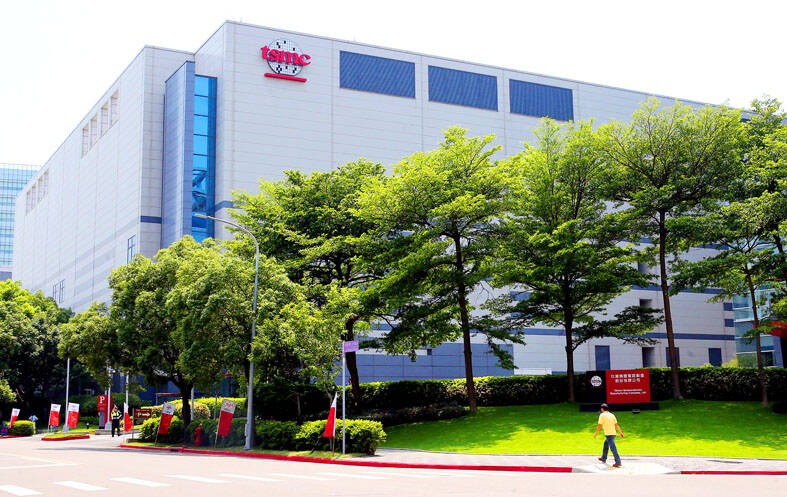Taipei-Hsinchu was the world’s 25th-largest science and technology (S&T) cluster this year, up from 27th last year, according to the Global Innovation Index 2024 released on Tuesday by the UN’s World Intellectual Property Organization (WIPO).
Each year, WIPO publishes a ranking of the top 100 clusters using patent application and scientific publication data to identify local concentrations of world-leading S&T activities.
Since 2016, the index has employed a bottom-up approach to identifying clusters.

Photo: CNA
The methodology disregards administrative or political borders and instead focuses on geographical areas that boast a high density of inventors and scientific authors, WIPO said.
As one of the three science parks in Taiwan, the Hsinchu Science Park (新竹科學園區) is home to many tech giants, including contract chipmaker Taiwan Semiconductor Manufacturing Co (台積電), which has been the country’s largest patent applicant for years.
Tokyo-Yokohama in Japan retained the title as the world’s top-performing tech hub, followed by China’s Shenzhen-Hong Kong-Guangzhou, whose ranking remained unchanged.
WIPO said the top two clusters benefited from a large number of patents filed by Mitsubishi Electric Corp in Tokyo and Huawei Technologies Co (華為) in Shenzhen, China.
Beijing came in third, followed by Seoul, Shanghai-Suzhou in China, San Jose-San Francisco in the US, Osaka-Kobe-Kyoto in Japan, Boston-Cambridge in the US, Nanjing, China, and San Diego, California.
The country with the most S&T clusters was China, which held 26 of the top 100 spots.
The US was second with 20.

Sweeping policy changes under US Secretary of Health and Human Services Robert F. Kennedy Jr are having a chilling effect on vaccine makers as anti-vaccine rhetoric has turned into concrete changes in inoculation schedules and recommendations, investors and executives said. The administration of US President Donald Trump has in the past year upended vaccine recommendations, with the country last month ending its longstanding guidance that all children receive inoculations against flu, hepatitis A and other diseases. The unprecedented changes have led to diminished vaccine usage, hurt the investment case for some biotechs, and created a drag that would likely dent revenues and

Global semiconductor stocks advanced yesterday, as comments by Nvidia Corp chief executive officer Jensen Huang (黃仁勳) at Davos, Switzerland, helped reinforce investor enthusiasm for artificial intelligence (AI). Samsung Electronics Co gained as much as 5 percent to an all-time high, helping drive South Korea’s benchmark KOSPI above 5,000 for the first time. That came after the Philadelphia Semiconductor Index rose more than 3 percent to a fresh record on Wednesday, with a boost from Nvidia. The gains came amid broad risk-on trade after US President Donald Trump withdrew his threat of tariffs on some European nations over backing for Greenland. Huang further

CULPRITS: Factors that affected the slip included falling global crude oil prices, wait-and-see consumer attitudes due to US tariffs and a different Lunar New Year holiday schedule Taiwan’s retail sales ended a nine-year growth streak last year, slipping 0.2 percent from a year earlier as uncertainty over US tariff policies affected demand for durable goods, data released on Friday by the Ministry of Economic Affairs showed. Last year’s retail sales totaled NT$4.84 trillion (US$153.27 billion), down about NT$9.5 billion, or 0.2 percent, from 2024. Despite the decline, the figure was still the second-highest annual sales total on record. Ministry statistics department deputy head Chen Yu-fang (陳玉芳) said sales of cars, motorcycles and related products, which accounted for 17.4 percent of total retail rales last year, fell NT$68.1 billion, or

HSBC Bank Taiwan Ltd (匯豐台灣商銀) and the Taiwan High Prosecutors Office recently signed a memorandum of understanding (MOU) to enhance cooperation on the suspicious transaction analysis mechanism. This landmark agreement makes HSBC the first foreign bank in Taiwan to establish such a partnership with the High Prosecutors Office, underscoring its commitment to active anti-fraud initiatives, financial inclusion, and the “Treating Customers Fairly” principle. Through this deep public-private collaboration, both parties aim to co-create a secure financial ecosystem via early warning detection and precise fraud prevention technologies. At the signing ceremony, HSBC Taiwan CEO and head of banking Adam Chen (陳志堅)